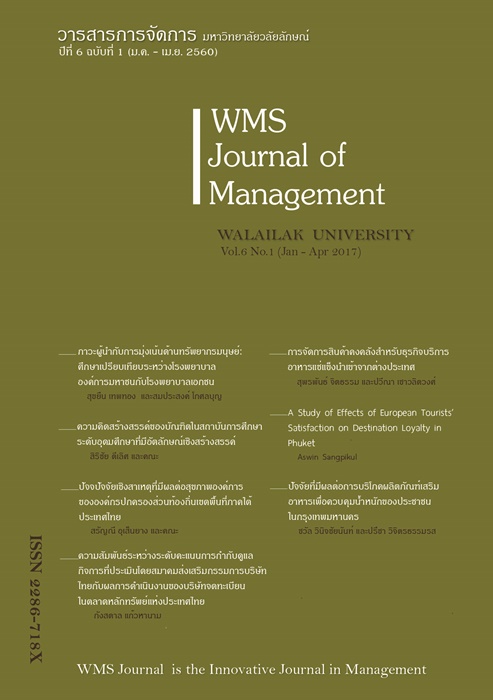Factors Affecting Weight Control Dietary Supplements Consumption of People in Bangkok
Main Article Content
Abstract
This research aims to study factors affecting the consumption of weight control dietary supplements of people in Bangkok. The study sample consists of people aged 20-59 years and living in Bangkok. The two-stage stratified random sampling was 390 persons. A questionnaire is used to collect data.
Results, analyzed by logistic regression show that there are four major influencing factors towards the consumption of weight control dietary supplement. Firstly, demographic factors, the persons aged between 30-39 years are 3.7 times more likely to consume the product than those aged between 20-29 years. Those who work as private employees are likely to consume the product less than the college students (82%). Secondly, source of information is considered as another factor. The persons whom directly receive information from dealers or sales persons are 6.5 times more likely to consume the product than those who get information from television program or advertisement. In addition, those receiving information from other channels, such as newspapers, magazines, and health journal are 7 times more likely to consume the product than those who get information from television program or advertisement. Next, marketing factors is also influential. In terms of distribution channels, if consumers have one level easier access to products, the likelihood to consume the products will decrease about 63%. For the marketing promotions, if the supplier increases one level of Marketing Strategy, the likelihood to consume the products will increase about 3 times. The last factor is attitude. If the positive attitude towards products increases by 1 point, the likelihood to consume the products will increase about 5.3 times.
Article Details
References
กรุงเทพธุรกิจ. 2556. พฤติกรรมคนไทยนิยม 'สวยด่วน' ดันสินค้าสุขภาพ 'พุ่ง'. สืบค้นเมื่อ 15 สิงหาคม 2558, สืบค้นจาก http://www.bangkokbiznews.com/new
s/detail/487284.
กาญจนา อยู่สุขเจริญ. 2554. ปัจจัยที่มีผลต่อพฤติกรรมการลดน้ำหนักของนักศึกษาหญิงระดับอุดมศึกษาในจังหวัดอุบลราชธานี. วิทยานิพนธ์ปริญญาสาธารณสุขศาสตรมหาบัณฑิต สาขาการสร้างเสริมสุขภาพ, มหาวิทยาลัยราชภัฎอุบลราชธานี.
ธงชัย สันติวงษ์. (2546). พฤติกรรมผู้บริโภคทางการตลาด. กรุงเทพมหานคร: บริษัท ประชุมช่าง จำกัด
ศิริวรรณ เลิศสุชาตวนิช. 2549. พฤติกรรมการบริโภคผลิตภัณฑ์เสริมอาหารที่ใช้ควบคุมน้ำหนักของบุคลากรสังกัด กระทรวงสาธารณสุข จังหวัดราชบุรี. วิทยานิพนธ์ปริญญาวิทยาศาสตรมหาบัณฑิต สาขาสุขศึกษาและ พฤติกรรมศาสตร์, มหาวิทยาลัยมหิดล.
ศิริวรรณ เสรีรัตน์. (2541). การบริหารการตลาดยุคใหม่. กรุงเทพมหานคร: บริษัท ธีระฟิล์ม และไซเท็กซ์ จำกัด
ศูนย์ข้อมูลกรุงเทพมหานคร. การแบ่งเขตตามที่ตั้งของพื้นที่. สืบค้นเมื่อ 15 สิงหาคม
, สืบค้นจาก http://203.155.220.230/m.info/nowbma/.
สำนักนโยบายและยุทธศาสตร์ สำนักงานปลัดกระทรวงสาธารณสุข. 2557. สาระสุขภาพ เรื่องเด่นปะจำสัปดาห์. สืบค้นเมื่อ 3 มีนาคม 2558, สืบค้นจาก http://wops.moph.go.th/ops/thp/thp/index.php?id=283&group_=03&page=view_doc.
สุขุมาลย์ ธีระสมบูรณ์. 2550. การตัดสินใจ ซื้อและพฤติกรรมการบริโภคผลิตภัณฑ์เสริมอาหารเพื่อการควบคุมน้ำหนักของผู้บริโภค ในเขตจตุจักร กรุงเทพมหานคร. วิทยานิพนธ์ปริญญาบริหารธุรกิจมหาบัณฑิต สาขาการจัดการทั่วไป, มหาวิทยาลัยราชภัฏพระนคร.
Katz, Daniel. “The Functional Approach to the Study of Attitudes,” Public Opinion Quarterly, Vol. 24 (Summer, 1960)
Marketeer. 2557. MARKETEER DATA. สืบค้นเมื่อ 23 กรกฎาคม 2558, สืบค้นจาก http://marketeer.co.th/2014/07/marketeer-data/.


